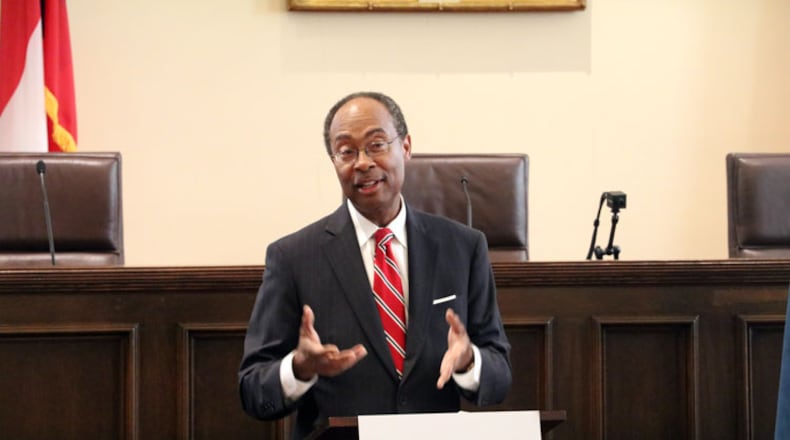The judge who will determine where Mark Meadows and at least four other defendants in Georgia’s election subversion case should be tried has been on the federal bench for 12 years and is no stranger to high-profile cases.
Here is what to know about U.S. District Court Judge Steve Jones:
He’s a “Double Dawg:” Jones was born and raised in Athens, graduating from Cedar Shoals High School. He received his Bachelor of Business Administration from The University of Georgia in 1978 and returned for law school, earning a juris doctorate in 1987. “My car crosses that Athens-Clarke County line and it starts driving better,” he quipped at a February 2020 speech at UGA. “This is home.”
He was appointed by Barack Obama: In 2010, Jones was passed over for a seat on the U.S District Court for the Middle District of Georgia, which included Athens. But in January 2011, Obama nominated Jones to the Northern District of Georgia, which incudes Atlanta. Jones was confirmed by a 90-0 vote in the U.S. Senate and sworn in on March 4, 2011. Before rising to the federal bench, he was an assistant district attorney, a municipal court judge and superior court judge.
Abortion rights: Jones blocked Georgia’s six-week abortion ban in 2020 arguing the U.S. Supreme Court had “repeatedly and unequivocally” upheld Roe v. Wade, which said that a state may not ban abortion before a fetus is viable. The state ban later took effect, however, after the U.S. Supreme Court overturned Roe in 2022.
A blow to Democrat Stacey Abrams: Jones ruled that Georgia’s election laws didn’t violate voters’ constitutional rights, handing a defeat to Fair Fight Action, a voting rights group founded by Abrams. The group had challenged various provisions of the state’s voter registration and absentee ballot laws, saying they discriminated against minority voters. But in 2022, Jones rejected all of Fair Fight’s claims. “Although Georgia’s election system is not perfect, the challenged practices violate neither the Constitution nor the VRA (Voting Rights Act),” Jones wrote in a 288-page order. He also ordered the group to repay the state more than $231,000 in trial costs.
Gerrymandering: He has scheduled a trial in September over three lawsuits which claim that Georgia’s congressional and legislative districts were drawn in a way that discriminates against Black voters. The lawsuits allege that Georgia’s redistricting in 2021 violated the Voting Rights Act’s protections against discrimination of Black voters, weakening their voting strength by splitting populations into different districts. Defendants for the state of Georgia disagree, saying the new districts are fair.
About the Author
Keep Reading
The Latest
Featured




